van der Pek district Walk
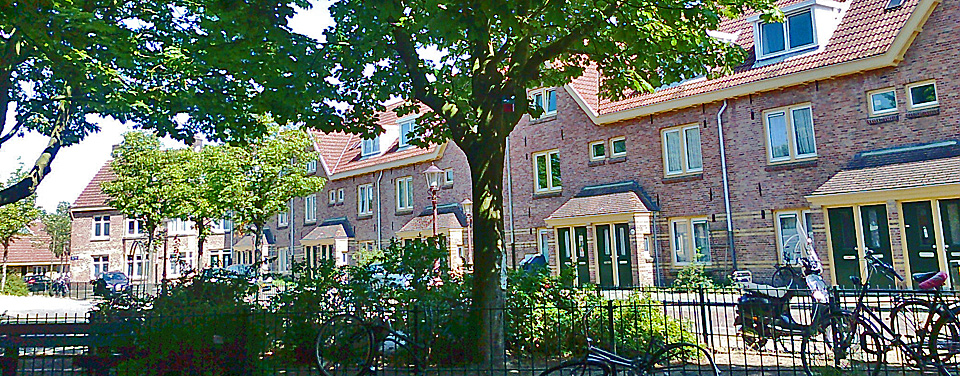
North - van der Pek district Walk
2.2 miles / 3.5 km
This is what I love about Holland and the Dutch: the excellent residential neighbourhoods that they built for the less well off. Wandering around the van der Pek district, you’ll see the attractive and sturdy architecture, small-scale planning, village atmosphere, and leafy green areas that distinguish this type of town-planning.
The walk includes a short trip on the ferry – from Central Station to the Buiksloterweg on the northern shore of the harbour. The ferry is free of charge because Amsterdam North is a part of the city; ferries depart very frequently and the time of the next ferry is clearly shown.
North - van der Pek district Walk (follow link to see in Google maps)
Willem I Locks (Willem I sluis)
Soon after getting off the ferry, you will walk past the massive Willem I locks that control the water level between the harbour and the area north of the city. The locks are nearly 200 years old and beautifully constructed. Take your time here and watch the pedestrians and cyclists crossing the locks and then the power as the locks slowly open to let boats (pleasure and commercial) through. The locks provide access to and from the waterways north of Amsterdam such as the North Holland Canal to Den Helder. But vice versa they allow boats from north of Amsterdam to reach the North Sea via Amsterdam and the North Sea Canal. Massive locks like this (65 metres long, 15 metres wide) are as much a part of Holland as tulips, windmills, and van Gogh.
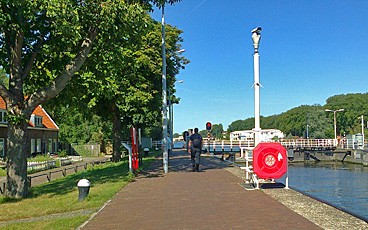
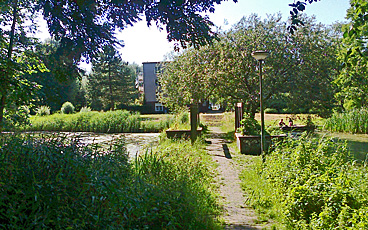
Van der Pek district (van der Pekbuurt)
All the streets in the van der Pek neighbourhood are named after flowers and plants. There’s the Lavendelstraat (lavender street), Lupineplein (lupine square), Jasminestraat (jasmine street), oleander, magnolia, broom, geranium and so on. It’s good to just wander around, in and out of streets and squares. Some parts are a bit neglected nowadays which is a shame and the issue of renovation crops up frequently – the fear being that developers will have other plans for this district. The houses are still in good condition however; when there’s dilapidation it’s often just cosmetic and sometimes just a question of clearing up rubbish and junk or a lick of paint. When the trees are green it’s really lovely.
The architect Jan Ernst van der Pek (1865 – 1919) designed this neighbourhood with the intention of providing quality housing for workers. Construction didn’t finish until 1923 which was after his death alas.
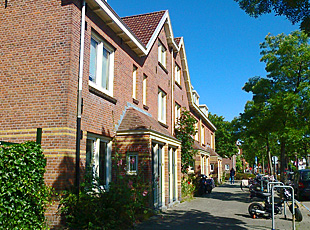
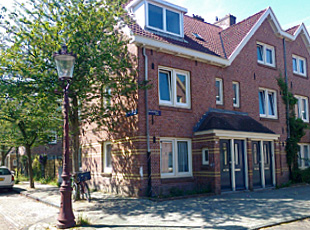
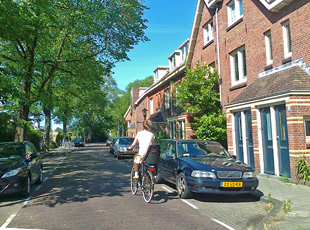
Bombed in the Second World War
The heaviest wartime bombing of Amsterdam was here in this area. The fatal allied bombing disaster took place on the 17th July 1943 and caused 158 immediate deaths and 119 badly injured. More than a hundred houses were destroyed and hundreds more were badly damaged. The target was the Fokker Aircraft Factory (being used by the Nazis) but the bombs missed and landed on the residential van der Pek district by mistake.
Around the Geraniumweg you will see a large area of more recent construction necessitated by the devastation
EYE Film Museum and Cinema
If you’re still feeling energetic, you can walk back along the north shore of the harbour and visit the (modern) EYE cinema and film museum.
Tips and details:
- This entire walk need take you no more than a few hours (2-3 depending). In summer you could take some food and drink with you and make a day of it. There’s lots of room along the north shore.
- Choose a bright day for this walk.
- Ferry: take the Buiksloterveer (ferry) to Buiksloterweg on the north shore of harbour. Make sure to take this ferry.
- Beware of bikes! Parts of this route adjoin a busy bike path which can be extremely hectic with bikes and scooters travelling at high speed (to and from the ferry).
More info van der Pek district on Iamsterdam.com
| good time for this walk | spring | summer | autumn | winter |
|---|
| area of walk | north | |
|---|---|---|
| west | centre | east |
| south |
Places to stop for a drink or food along the way:
-
EYE cinema and film museum
IJpromenade 1 (open from 10 a.m. until 1 a.m.)
-
Restaurant Café Modern
Meidoornweg 2 (dinner Mon to Sat from 7 p.m., lunch Wed to Sat from 12 p.m. til 3 p.m.)